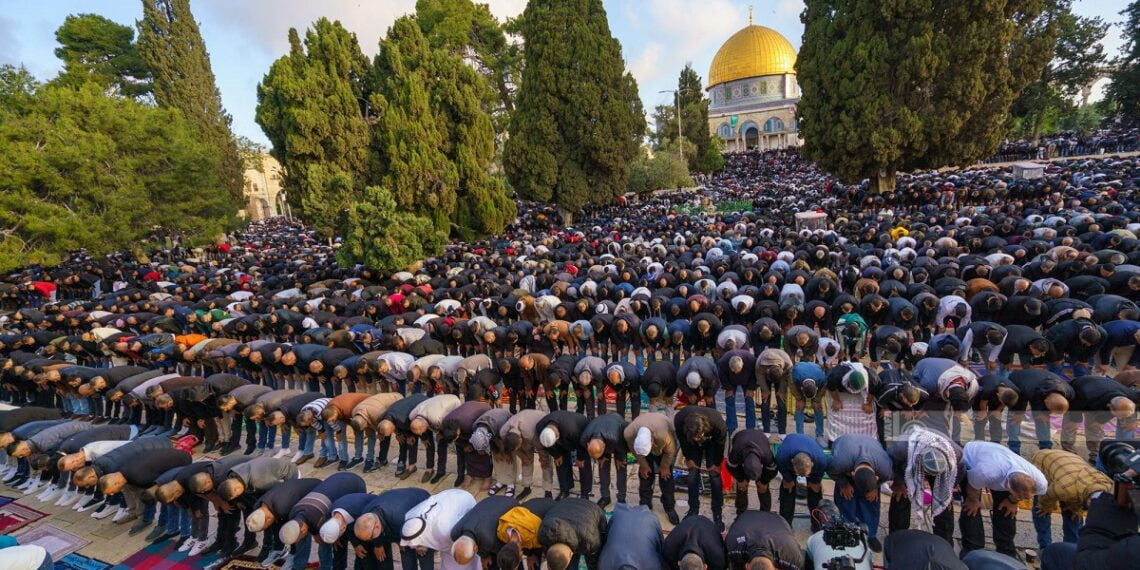After a month of fasting and praying, Muslims around the world celebrated the religious ceremony of Eid al-Fitr this Friday and Saturday, saying goodbye to Ramadan and welcoming the Shawwal month.
Millions of Muslims around the world celebrated the religious ceremony of Eid al-Fitr and held the pray of the end of Ramadan, the ninth month of the Islamic calendar, on Friday and Saturday. As the date of Eid depends on the sighting of the moon of the next month, there may be variations in the exact date that is celebrated among different Muslim countries as Eid al-Fitr.
A number of Arab countries, such as Saudi Arabia, Egypt, UAE, Jordan, Qatar, Sudan, as well as Turkey and Afghanistan, declared Friday as Eid after the sighting of the new moon of the month of Shawwal, the tenth month in the Islamic calendar. Other Muslim countries including Oman, Iran, Pakistan, Indonesia, Malaysia, Maghreb, and Brunei announced Saturday as Eid al-Fitr because the crescent moon was not sighted on Thursday evening.
What is the significance of Eid al-Fitr for Muslims?
Eid al-Fitr is in fact one of the most important Muslim holidays that is celebrated at the end of Ramadan and on the first day of Shawwal. Fasting on this day is forbidden for Muslims and it is obligatory to pay Fitria, a certain amount of payment in the form of cash, wheat, barley, dates, corn, etc. that is finally given to the poor in the Islamic society.
In most Islamic countries, this Eid is an official holiday. The number of holidays on the occasion, however, is different. In Saudi Arabia, for example, 13 days of official holidays are declared on this occasion. It is 6 days in Pakistan and 5 days in India. In Syria and Afghanistan, 3 days of official holiday are announced for Eid al-Fitr. In Iran, in the official calendar, 2 days are considered as holyday for Eid al-Fitr Festival.
Fasting for one month, Muslims have achieved inner purity at the end of Ramadan, and in fact, they have regained their true character of worshipping God. Muslims also believe that the pure nature of man throughout the year is affected by ignorance and neglect of the Almighty, making them move away from the truth. But with the arrival of the holy month of Ramadan, Muslims achieve a new life in the light of the spiritual atmosphere of this time.
In their unique ways, every Muslim country welcomes the holy Eid al-Fitr with its distinctive traditions and practices. Muslims celebrate this Eid with prayers called “Salat Al Eid” in Arabic. Muslims will gather in mosques or open spaces and offer two units of prayer – called “Rakat”. The prayers are followed by a sermon, in which the imam (the preacher) asks for forgiveness, prosperity, and peace for every being across the world.
This year’s Eid al-Fitr, not very happy for the Muslim world
Eid is a time of celebration and happiness, but this year’s Eid al-Fitr was held across the world amid rising tensions in Palestine and increasing attacks from Israel against the Muslim Palestinians. During Ramadan and on multiple occasions, Israeli forces stormed Al-Aqsa Mosque and attacked Palestinian prayers.
This year’s celebration was also marred by tragedy amid the explosion of conflict in Sudan. Clashes between Sudan’s military and the country’s paramilitary forces have left at least 400 dead, according to a report by the World Health Organization. The whole story erupted amid an apparent power struggle between the two main factions of Sudan’s military regime, the Sudanese armed forces and the powerful paramilitary Rapid Support Forces (RSF).








